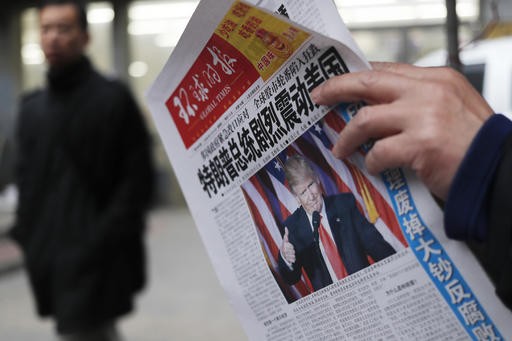COMMENTARY: Economic fundamentals key in coping with unexpected
The consensus prediction so far portends a stormy cloud ahead for the global economy as Trump during his election campaign championed trade protectionism, which could deal a heavy blow to emerging economies.
Change Size
 A man reads a newspaper with the headline of "US President-elect Donald Trump delivers a mighty shock to America" at a news stand in Beijing, Nov. 10, 2016. (AP/Andy Wong, File)
A man reads a newspaper with the headline of "US President-elect Donald Trump delivers a mighty shock to America" at a news stand in Beijing, Nov. 10, 2016. (AP/Andy Wong, File)
U
nited States president-elect Donald Trump will be inaugurated later this week, and more than 2,000 economists, businesspeople, financial leaders, senior executives of multilateral development banks and policymakers who gathered here Monday and Tuesday at the 10th Asian Financial Forum (AFF) waited for his policy statements with trepidation.
The consensus prediction so far portends a stormy cloud ahead for the global economy as Trump during his election campaign championed trade protectionism, which could deal a heavy blow to emerging economies.
His threat of a trade war between the US, the world’s largest economy, and China, the second largest, seems unthinkable, but is roiling international markets.
The International Monetary Fund’s latest global economic outlook report, which was issued on Tuesday, also cited uncertainty surrounding the policy stance of the incoming US administration and its global ramifications as the biggest caveat of its macroeconomic prediction.
“We expect the unexpected and prepare for the unexpected,” asserted Raghuram Rajan, former governor of the Indian central bank and one of the keynote speakers at the AFF, in referring to the mounting wave of public and political skepticism in developed countries toward free trade and other aspects of globalization.
Earlier last year, the United Kingdom’s vote to exit the European Union, or Brexit, had raised great concerns that anti-globalization sentiment was on the rise in developed economies.
But after the Brexit vote last June and Trump election last November, many things previously unthinkable now seem possible.
Rajan, who was chief economist of the IMF from 2003 to 2006, pointed to the fear and anger among the middle class in developed countries, who lost jobs as a result of technological change, free trade and globalization.
The mainstream attitude of economists and businesspeople from Asia, the Middle East and Europe and Russia attending the conference still strongly believe in the merits of free trade for productivity and economic welfare, both in developed and emerging economies.
Hence, the consensus is that barriers to trade and international capital’s movement should be reduced.
While it was recognized that there could be losers from free trade in developed economies, these losers were assumed to be few and temporary, compared to the gainers. But the political upheavals of last year forced economists to reconsider what is now called “populism”.
Populism seems to appeal to the group in society left behind by the economic development. Older and low-skilled workers, especially those in rural areas, have seen their relative incomes fall.
“Technological change has caused technological unemployment” Rajan said in describing the losers of globalization.
Mohamed El-Erian, the chairman of President Obama’s Global Development Council, another keynote speaker, noted “you can, to a certain extent, tolerate inequality in income but inequality of opportunity could cause anger [and lead to] social conflict”.
It is now increasingly recognized that the gains from globalization can only be defended and sustained if the losers are compensated by the winners. Otherwise, the political opposition to the process of globalization will embolden, Rajan has warned.
The main gainers from globalization have been unskilled labor in the emerging world, and those at the upper end of the income bracket in developed economies. The main losers have been manufacturing workers in the developed world.
Trump’s widely-publicized fiscal pump-priming on infrastructure and slashing corporate tax rate may harm Asian currencies as they weaken against the inflated US dollar.
This, combined with Brexit, generated the second headwind of political uncertainty, which may spill into upcoming elections this year in France, Germany and Italy. Further worrying emerging countries, especially Indonesia, is the prospect of higher interest rates in the US, which would generate a higher pace of capital inflows.
While Indonesia’s overall debt level is relatively low for Asia, it is still vulnerable to sudden capital inflows as foreign investors hold about 40 percent of the government’s rupiah bonds and nearly 90 percent of US dollar bonds.
Then with increasing uncertainty and risk factors for investment and growth in the short and medium term, how can governments in emerging countries prevent disruptive capital outflows?
Tightening monetary policy to increase the interest rate differential in order to generate higher returns for foreign portfolio investors, while attractive, could cause a big drag on economic growth.
The consensus policy recommendation among central bankers and financial regulators is simply “back to basics”, meaning enhancing inclusive growth, continuing the structural reform to strengthen the economic fundamentals by maintaining low fiscal and current account deficits, low and stable inflation, manageable foreign debt, strengthening the banking sector and building up sizeable foreign reserves.
IMF’s deputy managing director, Tao Zhang, concurred that strengthening economic resilience is the first line of defense against uncertainty and the downside risk of financial market volatility. By focusing on building resilience, Asia can also benefit most from the vast investment and trade opportunities opening up within the region (intra-Asia trade).
Stephen Gross, the Asian Development Bank’s vice president for East Asia, Southeast and the Pacific, cited Indonesia as an example that succeeded in curbing capital outflows after the Fed taper tantrum in May 2013 (reducing stimulus) by taking a painful move of slowing down economic growth (stops overheating) to check its current account deficit.









